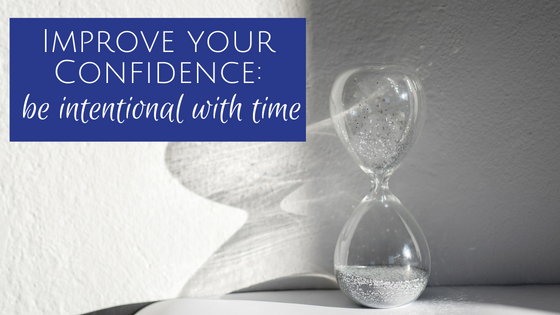Improve your confidence: be intentional with time
/One of the biggest contributors to feeling more confident in our career, life and business is knowing we are living and working aligned with what matters to us. That is, our decisions and actions marry with our values, and our strengths and skills support that also. Once we have clarity around what matters, our values, strengths and skills, the next step is to adjust our life to remove everything that doesn’t matter (as much as possible) to focus on what does matter.
Being Intentional with our time boosts confidence
In essence, once we have clarity, it’s time to live with intention. As when we live with intention, we feel aligned and confident!
This is what I work on with my coaching clients; we get clear on what matters and adjust our lives accordingly, which leads to greater confidence.
After years of working with people in this way, one of the biggest stumbling blocks many of my clients express is how to use their time with intention. With a multitude of commitments and demands upon their time, both for themselves and their families, many struggle with a feeling of “too much” busyness, often bordering on overwhelm.
Therefore, getting intentional about how we use our time is a vital step when we want to simplify our life, live connected with our values and experience greater confidence.
Getting started
When working with clients in a coaching series, the first session always looks at our foundations. That is, we look at what we already have in our life that is supporting us to achieve and feel good right now.
Similarly, when we desire to simplify our life, we look at how we currently use our time. After all, one of the major components of simplifying our life is removing or subtracting all those activities, tasks and commitments that do not align with our values and where we want to go.
Clients can see the benefit of being intentional, as the desire to maximise their energy and time when being with the people they love, completing tasks and undertaking their work is clear. They know how they want to FEEL but struggle with the gap between the vision of what they would like and their current reality.
Undertake a Time Audit
UNdertake a time Audit
To help close this gap, and determine the small steps to being more intentional we undertake a time audit. And yes I know, a time audit sounds hard and very boring, but it is incredibly effective.
But before you click away – stick with me!
A time audit can be enormously instructive as it provides hard data. We all are guilty of overestimating or underestimating how much time we need to complete a task or how much time we spend on certain tasks.
How to complete a time audit
Instead, we are best to rely on hard data. Thus, for many clients, I recommend completing a time audit for one week. A time audit requires you to document your activity for each part of the day. With my clients, I recommend 30-minute increments, starting the day at your usual wake time. Now, before you think this is far too burdensome, remember, we are aiming for solid information! From experience, let me reassure you, most people can remember details from the previous 3 to 4 hours. So completing a time audit document approximately 4 times a day covers the bulk of your day. And it’s only for one week.
Importantly, the time audit will provide you with invaluable information and data. You can then assess where you’re spending your time, and if it aligns with what matters most to you.
My Time Audit data lead to reading more Books
For example, I have always loved reading and called myself a reader. Yet a few years ago I believed I didn’t have enough time to read. Then I completed a time audit and saw I was spending many hours on social media over the course of the week. It was eye-opening, and a bit alarming. But the data was there, and I couldn’t argue with it.
Seeing the data raised my self-awareness, and was the prompt I needed to change my behaviour and read more.
Expand your view
Reassess your use of time
As mentioned above, I took a week-long view for my time audit. This was based on a suggestion in Stephen Covey’s The 7-Habits of Highly Effective People (one of the very first personal and professional development books I read, borrowed from my Dad’s bookshelf).
So, if you are playing along, after completing your time audit, you’ll also have a great picture of how you spent the week. And this is where the second step comes in. Rather than thinking about your week as 7 lots of 24 hours, let’s expand it to 168 hours. That’s the WHOLE week.
When we look at the complete 168 hours, it is easier to see patterns emerge, and where there might be opportunities for downtime, removal of other commitments and perhaps most importantly, fitting in more of those things, activities and commitments that light you up and align with what matters most to you.
Perspective and priorities shift
Like Covey explained back in the 1980s in his book, and as I’ve seen time and again with my clients when we expand our view to a longer timeframe, we shift our perspective. And this approach can be transformative. The simple shift in thinking about our time in a week-long approach can help us reframe, reassess and re-evaluate how we spend our time.
You may have more time to read books
In addition, as our perspective shifts, so do our priorities. We can see that perhaps we do have time to volunteer with our local community group. They ask for three hours across the week, which feels easier to agree to when we consider it as three hours from 168, not three hours from 24. Similarly, we might discover we have time for exercise, to accept a new leadership role or time to develop a new business. Or, like me, you might find you have a lot more time to read books than you first realised!
This is a core step when we want to take action on the clarity we’ve gained about what matters to us. By seeing how we can marry up our most limited resource, time, and align it with how we want to live our lives, and what matters to us within our career and business, we embrace being more intentional.
Of course, let’s not forget the importance of building in empty or open spaces. Greg McKeown talks about the idea of a buffer in Essentialism. A buffer is a space on either side of your key appointments or commitments. This little bit of breathing space can help everything feel calmer and your life feels more spacious. Additionally, as both my clients and I can verify, it limits the feeling of being too busy, so less risk of overwhelm. Building in space to our day and week allows us to truly focus on what matters, and contribute the best way we can. Plus, it’s practical. So often commitments or appointments run over, or things take a little longer than we had first thought. Space is key when life happens. By having a buffer of clear space in our schedule, we allow for these eventualities.
Why it matters
You may find time for a new Exercise Habit
As I have written about before, when we are intentional with our time, and create and embrace windows of time, we can be more strategic about focusing on what matters to us. What we choose to do with the extra time is up to us!
Maybe, by being deliberate in your use of time, you will create space in your schedule for the personal or professional pursuits you’ve been wanting to tackle. For example, committing to an hour every week to start your own business. Alternatively, you might find by being intentional there are more available timeslots and opportunities for you to start a new exercise habit, connect with the community, or achieve your goals. It may even lead to bigger life changes!
When we are more intentional in how we use our time, we feel more confident. We can live a life of greater meaning and purpose when we are deliberate and strategic in how we use our time to ensure is aligned with the highest contribution we can bring, and connected to our values.
“Life is lived in hours, and when we use our hours well, we build a life we love.”
Take action
Reading about being intentional in our use of time, and acting on the time audit suggestion included here can certainly help you take steps to be more aware of how you use your time, and lead to greater confidence.
But perhaps you are seeking more practical steps to improve your confidence. Then you’ll love my FREE book, The A to Z of Career and Life Confidence!
The book provides you with a whole alphabet’s worth of valuable tips for how to boost your confidence in your career, business and life. Download your copy here.
Of course, when you want to feel your best, and experience greater confidence in ALL areas of your work and life, working with a coach (that’s me!) is the best option for a perfectly tailor-made custom coaching program that speaks to your unique strengths, values and talents. As well as addressing your specific personal goals.
If you’re interested in working with me and wonder if a coaching program is right for you, click through to learn more.

















